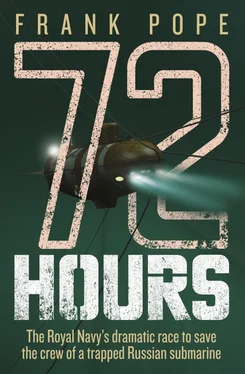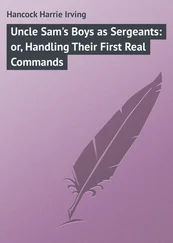Royal Naval Trafalgar-class Attack Submarine, Submarine exercise area, North Atlantic
It should have been the one of the best moments of his career. Instead four men died a violent death beneath the waves.
Lieutenant Commander Ian Riches was at the final stage of one of the most punishing selection processes in the force: the submarine command – or ‘Perisher’ – course. Four weeks of exercises at sea were the culmination; a trial by fire designed to push candidates past their breaking point. At stake was the ultimate honour: the right to command a submarine.
Riches was about to take control of the 85-metre-long Trafalgar-class submarine for his next test. Two of the six candidates had already been failed and removed from the boat, but he was confident. Success was so close he could smell it.
The nuclear submarine was already running silent, pursued by a Naval frigate somewhere above her. Her corridors were filled with intense, hushed activity as the vessel slipped through the deep. Riches threaded through the passageways, the sound of his footfalls ringing loud in his ears as it echoed among dense pipework that lined both walls and ceiling. This was one of the most advanced weapons in the world, the front line of defence for Her Majesty’s Government, and Riches knew every valve, gauge and dial.
He ducked through the forward hatch and into the Weapons Stowage Compartment that doubled as accommodation for the candidates. Four Tigerfish torpedoes were against one bulkhead, his bunk against the other. Grabbing his charts from beside the mattress he headed for the Control Room and checked his watch: 2 a.m.
The darkened control deck was calm when he stepped off the top rung of the ladder and informed the Duty Captain, one of his fellow candidates, that he’d been told to take over early. The departing officer looked relieved. His run of exercises had gone well, but laying mines while evading a warship in confined conditions was like playing an intense, high-stakes game of chess while blindfolded. He was ready for a break.
As the helmsman brought the submarine around in a long, sweeping turn to starboard to get into position for the next exercise, the Duty Captain began briefing Riches on the vessel’s status. The report ran in a structured sequence. Mechanical condition came first. Then their position, surrounding seabed terrain, threats and current operations would all be described, after which Riches would be in the hot seat.
In a darkened room just a few metres away, the sonar controller sat listening to the eerie noises of the deep. In other circumstances he could rely on active ‘pings’, a sonic flashlight that would illuminate everything around the submarine. But the frigate still lurked somewhere above; an opponent that would detect them if someone dropped a spanner, let alone if the submarine sent out a sound pulse. Instead the sonar controller had to rely solely on the other sounds that were echoing around the undersea trench through which they were moving to tell him what lay close.
The pulsing green display in front of him gave a visual indication of which bearing the sounds were coming from, but distances remained hard to gauge.
The controller counted the engine sounds of various fishing vessels above. One, two, three targets. Then, to the north, a fourth sound, which he logged as Contact 05. It was a loud signature, slightly ragged. He’d keep an eye on it.
By 02.10 the submarine had straightened her course and was now heading to the northwest.
The sonar controller was watching Contact 05 ever more closely. It didn’t look right. Suddenly the contact split into two and part of it began moving across his screen.
‘Contact zero-five bearing 306 degrees, moving slowly right…’ he said, his voice broadcasting across the Net, the open system of speakers that connects the Control Room with the darkened and acoustically shielded Sound Room.
The Duty Captain immediately broke off from the handover sequence and turned away to listen to his officers. ‘Port fifteen,’ he said, ordering an immediate course alteration.
‘Contact zero-five bearing 330 degrees, moving fast right,’ came the voice on the Net, more insistent now. The sonar target that had been on a constant bearing was suddenly passing fast. They were far too close.
‘Port thirty,’ he said.
A tense silence followed, broken by the Operations Officer reporting that the contact had been avoided, at a minimum distance of 200 metres away.
‘Ease to ten, steer 260,’ he said with evident relief, and turned back to Riches. ‘Right, where were we?’
The two officers restarted the handover, but 30 seconds later a loud impact slammed through the submarine. Everybody braced, heads whipping forward to starboard where the noise had come from. The scene seemed to freeze for a long second. Then the crew’s training kicked in, with each man running through checks and demanding status reports.
‘Log speed increasing,’ shouted the Ship Control Officer. ‘Fifteen knots. Twenty knots. Thirty knots.’ His voice was almost defensive. He had not ordered an increase in speed from the engine room, and engine RPM was constant, yet the speed indicated on his display was shooting up.
‘Stop main engine!’ ordered both the Duty Captain and the Ship Control Officer simultaneously.
But it was too late. An awful screeching noise began to reverberate through the submarine. Disaster had struck.
Thursday, 4 August 2005
15.30 Kamchatka
Berezovya Bay, 70 kilometres south of Petropavlovsk, Kamchatka Peninsula, Russia’s western Pacific coast
Thirteen years later, aboard the Russian Federation Navy’s mini-submersible AS-28 , 200 metres down off Russia’s northeastern coast, 23-year-old Captain Lieutenant Vyacheslav Milachevsky took his hands from the controls and flexed his fingers. He’d been holding on too tight. This was only his seventh dive in the craft and his eyes were narrowed with concentration as they flicked between the three portholes.
The forward compartment was dark, save for the pulsing green light of the sonar that swept over damp metal equipment and the faces of the men squeezed in around it. The submersible was built for four, but today there were seven men on board.
They’d been down for five hours, close to the limit of the craft’s six-hour endurance. There was no insulation, and the curved titanium hull was only a few degrees above freezing. There was no heating, other than the warmth radiating from the electric motors.
Milachevsky steeled himself with the thought that they would soon be able to step out into the warm sunlight, to stretch, smoke a cigarette and relieve themselves. There was no way he could know of the danger that lurked in the darkness ahead.
The dark waters off Russia’s Pacific border had been the stage for many a silent, deadly, Cold War drama. Beyond the fuming volcanoes of the Kamchatka Peninsula, only thousands of miles of open ocean lay between Russia and its foes of old, the United States. As a result, the continental shelf was studded with top-secret military installations.
The Priz-class mini-submersible AS-28 was currently operating near one of the enormous hydrophone arrays that had been deployed off a remote stretch of the peninsula to listen for the whisper of enemy submarines. Enormous steel cylinders filled with air supported a series of underwater microphones that captured the sounds of the deep and transmitted them to listening stations ashore. Anchored to the seabed and floating in mid-water, these chambers needed regular maintenance to keep them in position, while the hydrophones themselves needed to be cleaned and the cables connecting them to shore inspected.
Читать дальше













